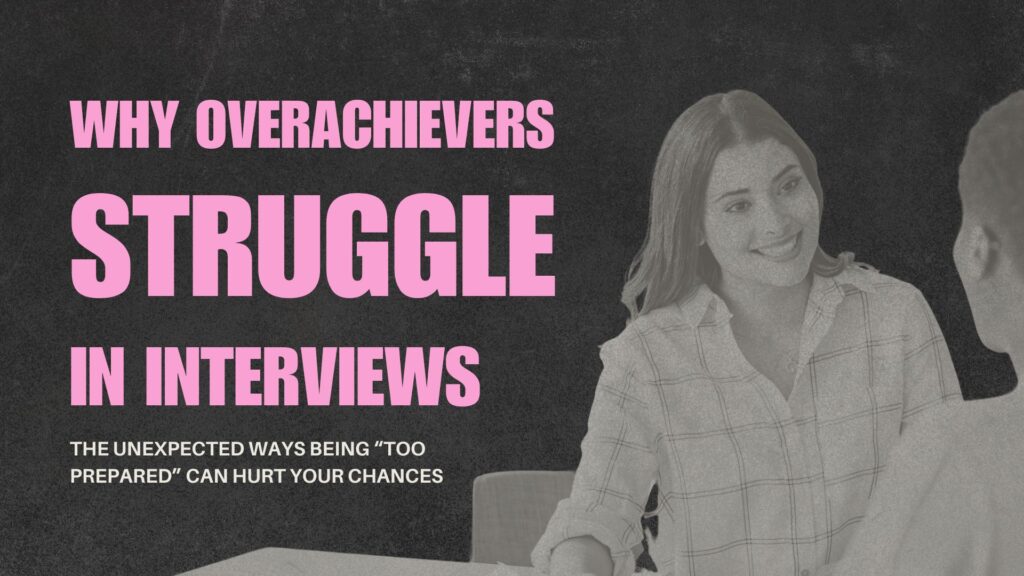
Overachievers are known for their relentless drive, meticulous preparation, and high standards. These traits make them incredible students, employees, and leaders. But in the interview room, the very qualities that set them apart can backfire, leaving them feeling frustrated and wondering where it all went wrong.
If you’ve ever walked out of an interview thinking, I had all the answers. Why didn’t I get the job?, this might be why: Over-preparation can create a barrier between you and the person sitting across from you.
Let’s unpack this paradox and explore why overachievers sometimes struggle in interviews—and how you can turn things around.
How Overachieving Can Work Against You
- Your Answers Sound Too Rehearsed
Overachievers tend to over-prepare, memorizing answers and practicing responses to the point of perfection. While this level of preparation seems like a good idea, it can make your answers sound robotic or overly polished.
Interviewers aren’t just evaluating your technical skills—they’re looking for authenticity. If your responses sound like they’re coming from a script, it can feel like you’re hiding your true personality. - You Overshare or Overcomplicate
In an effort to showcase your expertise, you might fall into the trap of giving too much information. Instead of delivering concise, impactful answers, you go on long tangents, sharing every detail of a project or accomplishment.
The result? Your key message gets lost, and the interviewer tunes out. - You Avoid Vulnerability
Overachievers often feel the need to project perfection. When asked about weaknesses or challenges, they deflect or spin their answers into strengths. While this tactic may seem smart, it can come off as insincere.
Interviewers don’t expect you to be flawless—they want to see how you handle setbacks and grow from them. - You Focus Too Much on “Selling” Yourself
In your quest to prove your worth, you might forget the purpose of the interview: building a connection. If you’re constantly trying to impress, you might miss opportunities to engage in meaningful, two-way conversations with the interviewer.
How to Adjust Your Approach
The good news is, you don’t need to sacrifice preparation to excel in interviews. It’s all about shifting your mindset and approach.
- Focus on Stories, Not Scripts
Rather than memorizing exact answers to common questions, prepare a handful of personal stories that highlight your skills, values, and accomplishments. Use these stories as a foundation, and let the conversation flow naturally. This keeps your responses authentic and engaging. - Be Concise and Structured
One of the easiest ways to avoid oversharing is by using the STAR method (Situation, Task, Action, Result). This framework ensures your answers are structured, focused, and impactful. Aim to keep your responses under 2–3 minutes. - Embrace Vulnerability
When discussing weaknesses or challenges, resist the urge to spin them into strengths. Instead, share genuine examples of difficulties you’ve faced and how you’ve overcome them. This shows self-awareness, adaptability, and a willingness to grow—qualities that hiring managers value. - Balance Preparation with Flexibility
Preparation is essential, but don’t let it lock you into rigid responses. Treat the interview like a conversation, not a performance. Be curious, ask thoughtful questions, and adapt to the flow of the discussion. - Shift the Focus From “Proving” to “Connecting”
Instead of trying to prove that you’re the perfect candidate, focus on connecting with the interviewer. Show enthusiasm for the role, ask questions about the company culture, and demonstrate how your skills align with the organization’s needs.
The Overachiever’s Edge
Here’s the thing: Overachievers bring an incredible set of strengths to the table—discipline, drive, and a strong work ethic. These traits can absolutely set you apart in an interview, as long as you channel them in the right way.
The key is balance. Prepare, but don’t overdo it. Show your expertise, but don’t overwhelm. Be confident, but stay humble and relatable.
At the end of the day, interviews are about more than qualifications. They’re about connection, communication, and authenticity. When you learn to embrace imperfection and focus on meaningful interactions, you’ll turn your overachieving tendencies into your greatest interview asset.
Conclusion
Being “too prepared” in interviews doesn’t always work in your favor. It’s about finding balance—showing your skills without sounding rehearsed. Focus on authentic storytelling, connecting with your interviewer, and staying flexible. The goal isn’t perfection, but to be memorable and confident in your value. So, in your next interview, be yourself and let your true strengths shine! You’ve got this!
Ready to update your resume and optimize your LinkedIn profile?
Reach out today! www.resumeassassin.com or mary@resumeassassin.com
Connect on LinkedIn: www.linkedin.com/in/mary-southern
Schedule a 15 Minute Call: https://calendly.com/resumeassassin/meet
